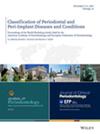Impact of dietary inflammatory index on gingival health
Abstract
Background
Periodontal disease is a biofilm-dependent chronic inflammatory condition triggered by a host response. Several factors impact systemic inflammation and could lead to changes in disease pathogenesis. Recently, studies have assessed the influence of nutritional patterns on the development of periodontitis. In the present cross-sectional study, we evaluated the dietary inflammatory profile on periodontal conditions, focusing on clinical, subgingival microbial, and cytokine assessment of individuals with periodontal health or gingivitis.
Methods
One hundred patients with periodontal health or gingivitis were included. Plaque index (PI), Bleeding on probing (BoP), the probing depth (PD), and the clinical attachment level (CAL) for each patient were assessed. Nutritional data and the Dietary Inflammatory Index (DII) were recorded by two 24-h food recalls on non-consecutive days. Biofilm and gingival crevicular fluid (GCF) to assess the microbiome profile and inflammatory biomarkers were collected. Multiple regressions focused on the DII, age, and sex as predictors of periodontal conditions were done.
Results
Age and moderate DII scores increased the risk of gingivitis by 1.64 and 3.94 times, respectively. Males with an elevated DII score had 27.15 times higher odds of being diagnosed with gingivitis and BoP (β = 6.54; p = 0.03). Elderly patients with a moderate or high DII score were less prone to gingivitis and increased BoP (p < 0.04) compared with younger subjects. Considering the DII, there were no differences in microbial alpha and beta diversity; however, distinct species abundance and a higher concentration of monocyte-chemoattractant protein-1 and interleukin 33 were seen in patients with a higher DII.
Conclusion
A pro-inflammatory diet significantly contributes to periodontal inflammation, modulating inflammatory biomarkers and affecting the subgingival microbial community in healthy individuals.

 求助内容:
求助内容: 应助结果提醒方式:
应助结果提醒方式:


